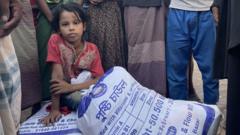Without immediate intervention, the situation for those reliant on aid could become dire, with reports indicating a substantial rise in preventable deaths and worsening living conditions for the most vulnerable populations in Bangladesh.
USAID's Life-Saving Support Faces Severe Cuts Amid Aid Crisis

USAID's Life-Saving Support Faces Severe Cuts Amid Aid Crisis
The abrupt halt of USAID funding threatens the survival of vulnerable populations in Bangladesh, including TB patients and Rohingya refugees.
The recent decision by the Trump administration to drastically cut USAID funding has plunged many in Bangladesh into precarious situations. Kajol, a 17-year-old tuberculosis patient and the sole provider for her family, relied on crucial support from USAID-funded programs, which abruptly ended, leaving her treatment incomplete and putting her life at risk. In Mohammadpur, a slum in Dhaka, local aid organizations have been critical in combating tuberculosis, but with funding cuts, initiatives like Nari Maitree are forced to halt their operations. The impact of these cuts extends beyond individuals like Kajol to the over one million Rohingya refugees in Cox's Bazar, who rely primarily on international aid for basic survival amidst the looming threat of food scarcity and disease outbreaks due to insufficient funding. As Bangladesh faces a health and humanitarian crisis, questions arise about how the nation will adapt to the loss of support previously provided by USAID.




















